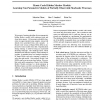Free Online Productivity Tools
i2Speak
i2Symbol
i2OCR
iTex2Img
iWeb2Print
iWeb2Shot
i2Type
iPdf2Split
iPdf2Merge
i2Bopomofo
i2Arabic
i2Style
i2Image
i2PDF
iLatex2Rtf
Sci2ools
ICML
1999
IEEE
1999
IEEE
Monte Carlo Hidden Markov Models: Learning Non-Parametric Models of Partially Observable Stochastic Processes
We present a learning algorithm for non-parametric hidden Markov models with continuous state and observation spaces. All necessary probability densities are approximated using samples, along with density trees generated from such samples. A Monte Carlo version of Baum-Welch (EM) is employed to learn models from data. Regularization during learning is achieved using an exponential shrinking technique. The shrinkage factor, which determines the effective capacity of the learning algorithm, is annealed down over multiple iterations of Baum-Welch, and early stopping is applied to select the right model. Once trained, Monte Carlo HMMs can be run in an any-time fashion. We prove that under mild assumptions, Monte Carlo Hidden Markov Models converge to a local maximum in likelihood space, just like conventional HMMs. In addition, we provide empirical results obtained in a gesture recognition domain.
| Added | 17 Nov 2009 |
| Updated | 17 Nov 2009 |
| Type | Conference |
| Year | 1999 |
| Where | ICML |
| Authors | Sebastian Thrun, John Langford, Dieter Fox |
Comments (0)

